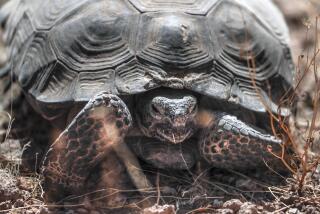Tortoise and the Cycle : U.S. Gives Bikers Green Light for Barstow-Las Vegas Off-Road Desert Race
RIVERSIDE — Federal biologists have concluded that the popular Barstow-to-Las Vegas off-road motorcycle race will not jeopardize the existence of the desert tortoise, California’s official state reptile and a species whose numbers have declined precipitously in recent years.
The opinion, made public Friday, prompted the U.S. Bureau of Land Management to announce that it would permit the Thanksgiving weekend race, which is expected to draw 1,200 riders and is often called the “granddaddy” of off-road vehicle events.
Scientists with the U.S. Fish and Wildlife Service said a partial rerouting of the 135-mile race course, along with a handful of new regulations governing the event, will protect both the tortoise and its most sensitive habitat from the speeding dirt bikers.
“If there is proper compliance with the stipulations we’ve come up with, then, theoretically, not one tortoise should die,” said Peter Stine, a senior government biologist. “The tortoise has a very wide distribution in the desert, and we just don’t believe this one event will jeopardize the entire species.”
Environmentalists, who in the past have fought the race on grounds that it harms the desert and its inhabitants, had hinted they might sue to block this year’s event. On Friday, the conservationists reaffirmed their opposition to the race but conceded that the new route--which will divert bikers through the U.S. Army’s National Training Center at Ft. Irwin--and other last-minute changes had resolved some of their concerns.
Also, they said any legal action would have little effect at this late hour.
“This event amounts to chewing up desert tortoise habitat for a one-day joy ride, and we strongly believe it will fuel the tortoise’s race toward extinction,” said Patricia Schifferle, western regional director of the Wilderness Society. “But the decision to permit the race was a fait accompli, and at least we were able to get BLM to create some protections for the tortoise.”
Deborah Reames, an attorney with the Sierra Club Legal Defense Fund who represented race opponents in negotiations with the BLM, noted that the agency has agreed to conduct a full-scale environmental review of the contest before deciding whether to allow it next year.
“That is a very important victory,” Reames said.
Such a study has not been done since 1982.
The so-called “B-to-V” race was first run in 1967. In ensuing years, its popularity mushroomed, and in the early 1970s, it attracted 3,000 competitors and was considered the premiere off-road race in the world.
In 1975, however, the race was halted, due largely to protest from environmentalists who charged that it inflicted irreparable harm on the desert. To protest the cancellation, hundreds of disgruntled bikers staged renegade rides each year on the anniversary of the race.
Citing new studies, the BLM allowed the competition to resume in 1982. Conservationists sued, but the courts upheld the bureau’s decision.
This year, new attention was focused on the race by the plight of the desert tortoise, a benign, slow-moving creature that spends much of its life in burrows beneath the harsh Mojave Desert. The reptile’s population has been decimated by predatory ravens, poachers, encroaching development, careless off-road vehicle riders and a mysterious respiratory disease.
State officials declared the reptile a threatened species last summer, and the federal government recently followed suit, granting the tortoise “emergency” temporary status as an endangered species.
Although concluding that the race would not imperil the reptile’s survival, the Fish and Wildlife Service urged that several precautions be taken. Chief among them is the rerouting of a 25-mile stretch of the course out of an area populated by tortoises and through degraded habitat on Ft. Irwin territory.
Also, the service recommended improved marking of the course to ensure that riders do not stray from it, and the agency urged that tortoise burrows be encircled with barrier tape.
In addition, biologists suggested that each racer be required to read a brochure discussing the tortoise’s fragile status and sign a statement agreeing to remain within course boundaries or face disqualification.
More to Read
Sign up for Essential California
The most important California stories and recommendations in your inbox every morning.
You may occasionally receive promotional content from the Los Angeles Times.










